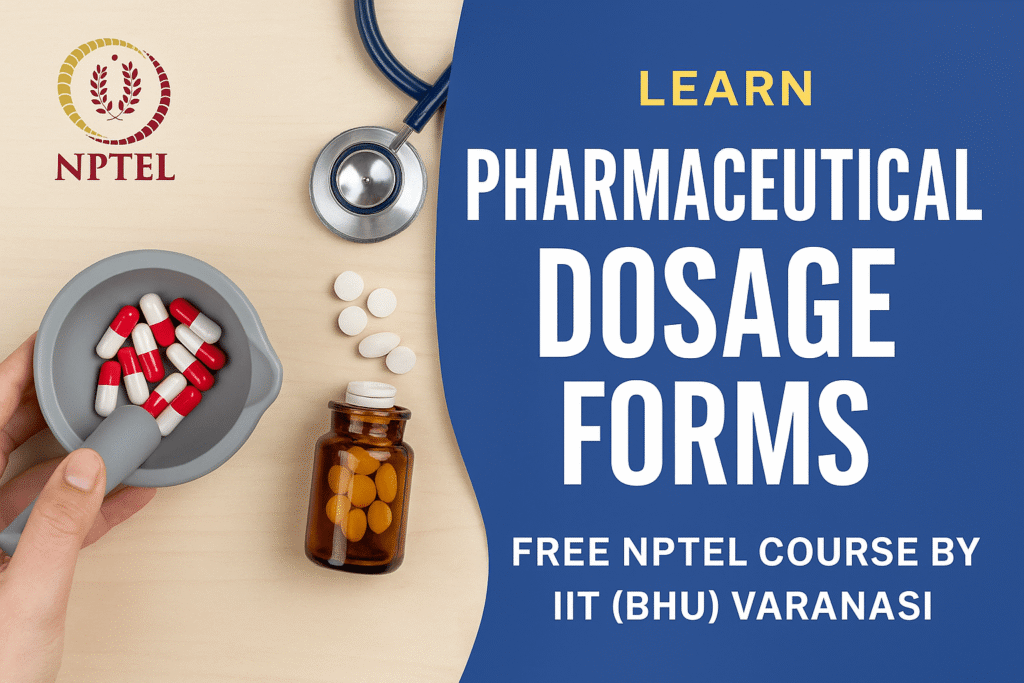In the pharmaceutical industry, dosage forms are the foundation of effective drug delivery. From tablets and capsules to emulsions and aerosols, each dosage form plays a vital role in ensuring that medications are safe, effective, and acceptable to patients.
Enrolling in IIT (BHU) Varanasi’s NPTEL online course “Pharmaceutical Dosage Forms,” taught by Prof. Ruchi Chawla, is the best way to become an expert in this field.
This free online course is a golden opportunity for pharmacy students, professionals, and researchers who want to dive deep into drug formulation, preformulation studies, and advanced delivery systems. Plus, you’ll get a government-recognized certificate from NPTEL and IIT after successful completion.

- May 17, 2025
- Abhishek .
- 10:31 am
- 1 comment
Introduction
Understanding dose forms is essential in the ever-evolving field of pharmaceutical sciences. Prof. Ruchi Chawla of IIT (BHU) Varanasi offers an in-depth examination of this important topic in his NPTEL course “Pharmaceutical Dosage Forms.” This course explores the science and technology underlying different pharmaceutical dosage forms, which are crucial for efficient drug administration and therapy. It is intended for both undergraduate and graduate students studying pharmacy and related subjects.
Course Overview – NPTEL Pharmaceutical Dosage Forms (2025 Edition)
| Feature | Details |
|---|---|
| Course Name | Pharmaceutical Dosage Forms |
| Platform | NPTEL Online Courses (Swayam) |
| Institution | IIT (BHU) Varanasi |
| Instructor | Prof. Ruchi Chawla |
| Duration | 12 Weeks |
| Start Date | 21 July 2025 |
| End Date | 10 October 2025 |
| Exam Date | 1 November 2025 |
| Enrollment Deadline | 28 July 2025 |
| Exam Registration Ends | 15 August 2025 |
| Certificate Available | Yes (with logo of NPTEL and IIT BHU) |
| Language | English |
| FDP Approval | AICTE Recognized for Faculty Development Program |
Who Should Enroll in This Course?
This course is tailored for:
- Undergraduate and postgraduate students in pharmacy and allied disciplines.
- Professionals seeking to enhance their knowledge in pharmaceutical dosage forms.
- Researchers focusing on drug formulation and delivery systems.
What You’ll Learn in This Course – Weekly Breakdown
The course curriculum is logically divided over 12 weeks and touches every core aspect of pharmaceutical dosage forms:
Lecture 31: Pharmaceutical suspensions- properties and evaluation
Lecture 57: Manufacturing Working Formula Procedures
Key Learning Outcomes
By the end of this course, you will:
- Understand the formulation science behind every pharmaceutical dosage form.
- Evaluate the quality and stability of tablets, liquids, emulsions, and semisolids.
- Learn GMP-compliant production steps.
- Analyze pharmacokinetics and biopharmaceutics principles for better drug delivery.
- Get exposure to the latest novel drug delivery systems.
📌 Also Read: 🎓Free Government Certified Course on Rational Use of Medicines for Registered Pharmacists – Enroll Online Today 2025
How to Enroll
Here’s how to enroll:
Visit the official NPTEL course page 👉 Click Here
Log in with your Swayam/NPTEL account or sign up
Click on “Enroll Now” before 28th July 2025
Register for exam separately before 15th August 2025
Course certificate
The course is free to enroll and learn from. But if you want a certificate, you have to register and write the proctored exam conducted by us in person at any of the designated exam centres.
The exam is optional for a fee of Rs 1000/– (Rupees one thousand only).
Date and Time of Exams: November 01, 2025 Morning session 9am to 12 noon; Afternoon Session 2pm to 5pm.
Registration url: Announcements will be made when the registration form is open for registrations.
The online registration form has to be filled and the certification exam fee needs to be paid. More details will be made available when the exam registration form is published. If there are any changes, it will be mentioned then.
Please check the form for more details on the cities where the exams will be held, the conditions you agree to when you fill the form etc.
CRITERIA TO GET A CERTIFICATE
Average assignment score = 25% of average of best 8 assignments out of the total 12 assignments given in the course.
Exam score = 75% of the proctored certification exam score out of 100
Final score = Average assignment score + Exam score
Please note that assignments encompass all types (including quizzes, programming tasks, and essay submissions) available in the specific week.
YOU WILL BE ELIGIBLE FOR A CERTIFICATE ONLY IF AVERAGE ASSIGNMENT SCORE >=10/25 AND EXAM SCORE >= 30/75. If one of the 2 criteria is not met, you will not get the certificate even if the Final score >= 40/100.
Certificate will have your name, photograph and the score in the final exam with the breakup.It will have the logos of NPTEL and IIT Madras .It will be e-verifiable at nptel.ac.in/noc.
Only the e-certificate will be made available. Hard copies will not be dispatched.
Once again, thanks for your interest in our online courses and certification. Happy learning.
Final Thoughts
If you’re serious about building a career in the Indian pharmaceutical industry, clinical research, formulation R&D, or regulatory affairs — this course will give you a strong foundational and practical edge.
Don’t miss out on this opportunity to learn from IIT BHU, one of India’s premier institutes, through the NPTEL platform.

Really clean internet site, thankyou for this post.